G. Bruce Boyer on Writing with Style
6September 30, 2013 by Ville Raivio
Foreword
Products from Pukimo Raivio
Ralph Lauren, Black Label suit, size 52EU
I had this little idea, but since I want to make it seem more important, I’m going to call it a theory. The thought came to me during this year while reading one of my favourite style sites and noticing how the amount of advertising banners and more or less ad-like content had slowly piled up. I had difficulties in differentiating whether the writer featured and covered the latest moves from certain makers as a personal favour to his friends or was money or a closetful of goods exchanging hands. Such is the case with several style sites which have taken their first virtual steps with an earnest mind, only to become yet another site in someone else’s pocket. Then again, I don’t have the details or insight into the workings of one writer from another. I won’t name names as I’m sure the differences on certain sites are clear to so many of us who’ve either grown into young adults or spent countless working hours (the trick is to look busy and pucker your lips) pouring over menswear.
This little theory on the half-life of earnest style blogging was something I kept myself busy with while reading my favourites and several others. It’s a great feeling, having a topic in mind and eventually seeing it online just as intended. It’s also a great feeling, the sound of the doorbell, the UPS guy with his eyes on his shoes or anywhere else than the customer, putting down an X to mark the spot, closing the door and — yes, finally — sniffing that shoe box, running fingers on that new, perfect pair of Timeless, Classic, Tasty Brogues in exchange for a feature or two. Is the pair an earnest one? Will it be featured and reviewed with a clean conscience? Perhaps the half-life is running thin or gone already, perhaps it doesn’t matter. Perhaps, perhaps, perhaps. Be that as it may or may not, I wanted to know G. Bruce Boyer’s thoughts on the current state of style writing, men’s magazines and the explosion of style sites. He was kind enough to devote his time for another Keikari interview since his first one. I had much to ask, he had more to answer. What follows is one man’s journey in writing with style.
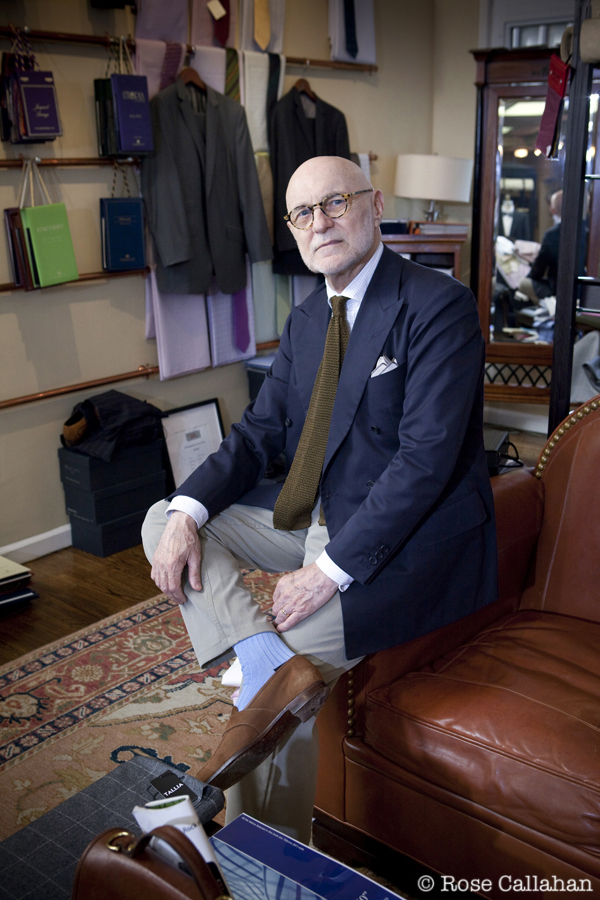 As seen by the inimitable Rose Callahan
As seen by the inimitable Rose Callahan
The Interview
VR: How did you first take up style as a subject matter? What lead you to this, should we say, somewhat lighter topic?
GBB: My interest in style comes from my background, which was lower Middle Class, growing up in a mid-sized East Coast US city. I’ve said this before, and still believe it’s true: those with little money must count on brains, hard work, and style to get ahead. Good manners and a sense of humor help as well. This is the nature of both the Dandy and Democracy: that our destinies are not written before we are born. I understood this from a very early age, and was lucky enough to have a mother who allowed me to experiment with my vision of myself. My belief is that we all invent ourselves to one degree or another. I tried all sorts of clothes, and noticed how people reacted to them. I carefully noticed how costumes on actors helped them play their parts. And I was quickly aware that some men in our neighborhood got more attention and respect because of their style. Style is neither superficial nor inconsequential. So when I came to writing, style was a good subject for me, I felt I understood it because, in a way, I had been studying it all my life.
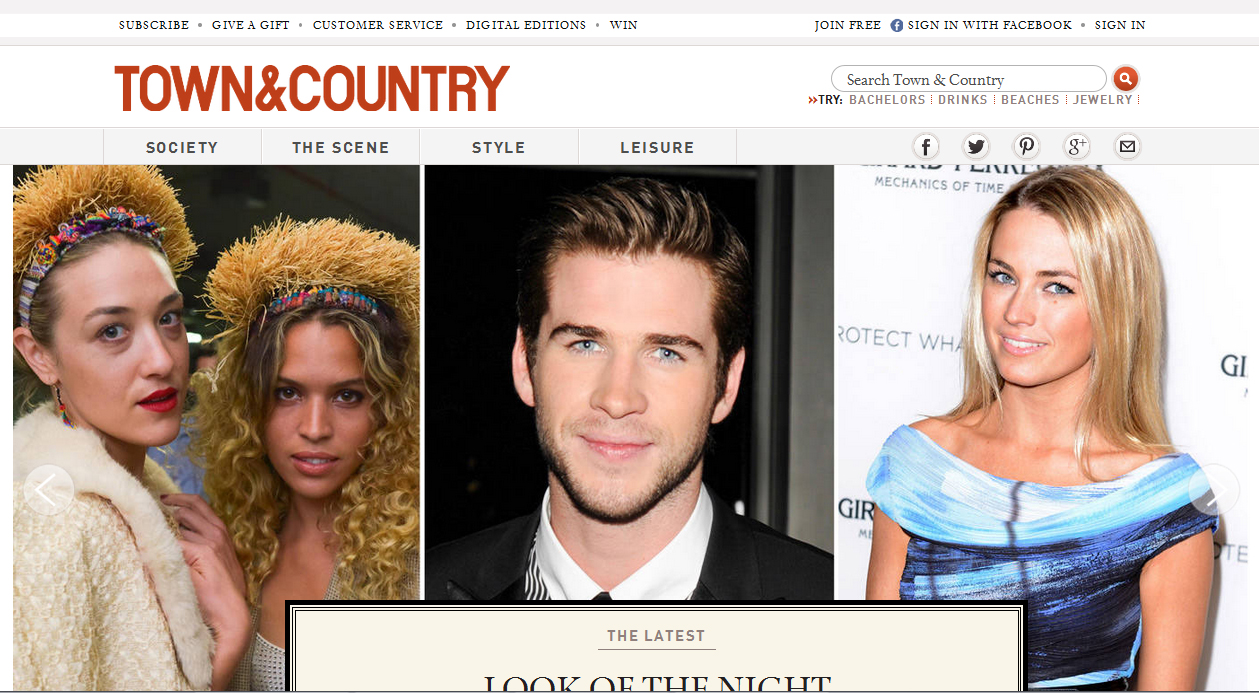 Town&Country, the makings of a journalist
Town&Country, the makings of a journalist
VR:I trust magazines have worked in tandem with makers and merchants since Apparel Arts, so more or less marketed content is not a new invention. Back in your time, did editors choose these makers and merchants themselves or did the highest payer receive kudos?
GBB: The relationship between advertising and editorial is one that has bothered me more and more over the years. I must say that when I was at Town & Country magazine the subjects about which I wrote were never tied to advertising, there was never even any discussion of this. It’s difficult to believe today because so many magazines are completely “ad driven”, and editorial space is obviously allotted to those who have some sort of financial relationship with the magazine. My feeling is that this is bad because it puts the reader deviously at the mercy of the advertiser. Not to mention that it makes the taste of the editor logically irrelevant impotent. Coming from an educational background — I was a teacher for eight years — my thought was always to educate the reader (the educational analogy would be that you get money for the school by producing good students), to help him with his choices and understanding. In other words, to put the reader first. When editorial and advertising are in bed together, the reader loses a great deal in my opinion, and this partially explains the importance and significance of blog sites which can go around this incestuous relationship by not being so dependent on ads.
I should add, in the spirit of transparency and disclosure, that since I have returned to Town & Country, there has been no discussion of advertising with relation to my choices of subject.
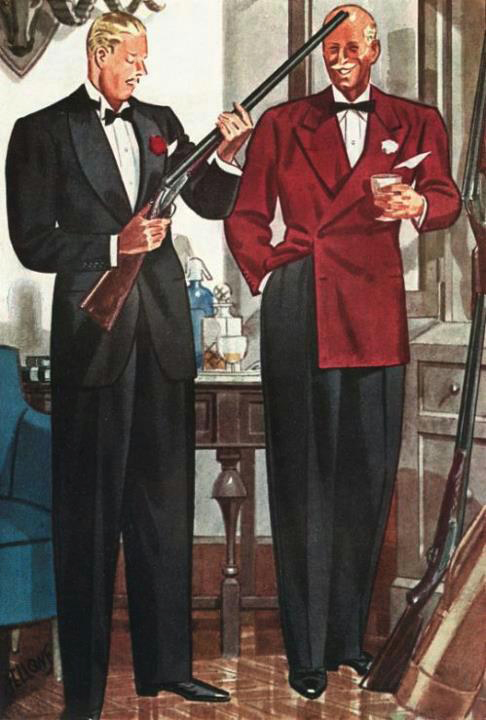 An L. Fellows illustration from the good old days of hunting
An L. Fellows illustration from the good old days of hunting
VR: You have no homepage, so I took a look at your Wikipedia entry. It states that you have worked as style editor for several magazines. How did you select topics for these men’s publications back then? How much say did style editors hold over the published content?
GBB: Wikipedia entries, at least in my case, are very misleading and erroneous. I’ve written for many magazines — including L’Uomo Vogue, The New Yorker, The New York Times, The Rake, Forbes, among them — but I was never a fashion editor at any magazine in any sense except Town & Country and Cigar Aficionado. My lance has always been for hire. Over the years most of the topics on which I’ve written I’ve selected myself. When I first started with T&C I wrote down a list of roughly a hundred ideas I wanted to write about, and I eventually went through the list and published articles about almost every one. I usually submit (the word is “pitch”) several ideas to an editor; occasionally an editor will ask me to write about a particular subject. Public relations people also pitch ideas to me, but not many of those usually fit my inclinations.
VR: All magazines, we’ll, at least those worth mentioning, have an editorial policy. Was it ever the done thing to give negative reviews, or were those companies or stores with poor service, quality and such just not mentioned?
GBB: I prefer to ignore rather than to attack. I’ve never given a negative review simply because I don’t write about things I don’t like. Things I find inferior in style and quality, or uninteresting, or of poor value I ignore. I don’t write about stores which give bad service, I simply don’t recommend them by ignoring them. I leave trashing to others who have the talent for it. But this question leads me to consider tangentially another question: for whom do I write? The answer is that I write for myself and for people whom I imagine are like me. I never try to “second guess” who my reader might be and what his interests are. I write about things I’m interested in and enjoy. It’s as simple as that. I’ve always, in fact, assumed that my readership was rather small, although our interests are broad. I like to write about jazz, literature, the art of acting, and craftsmanship generally as well as clothes, and have found that many of my readers share these interests.
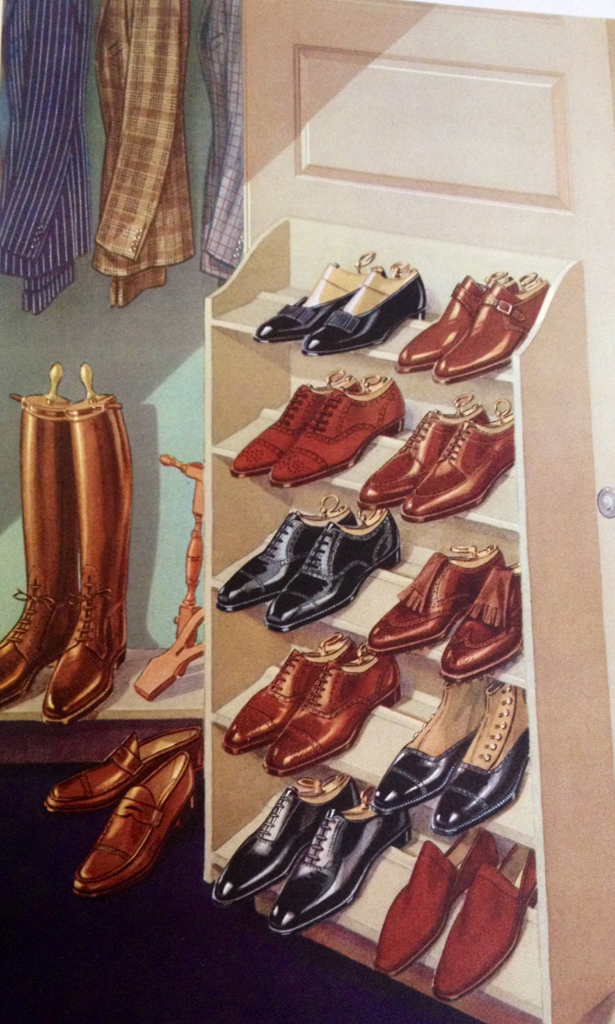 Apparel Arts on the suitable shoe collection
Apparel Arts on the suitable shoe collection
VR: Based on what I’ve read, you and George Frazier (whose collected works we’re still waiting for) are often mentioned as journalists who’ve used ‘high writing style’ with the topic of clothing. What lead you to use paragraphs and quotations from novels on your Cigar Aficionado columns and the collected pieces on Eminently Suitable?
GBB: George Frazier and I have been schooled in literature, philosophy, and history. In other words, we both have a good Liberal Arts background on which to draw. I think that accounts for us peppering our writing with quotes from Shelley and Keats, or referring to a historic battle, or the philosophy of Marx, or the music of Billie Holiday. These references are touchstones for us. I’ve noticed, to put it another way, that Frazier never gets into the business aspects of clothing, and neither do I. I think it’s because neither of us has been very adept at that approach. We both happen to think that Dickens, Emily Dickinson, Alan Ginsberg, A. E. Housman, and Homer have a lot to teach us.
VR: I trust you’ve followed the likes of Esquire and GQ over the decades. How do you feel their style articles have changed through the years? Has content been sacrificed to make room for pretty pictures and quick fixes?
GBB: I wish I could speak more highly of GQ and Esquire, because they both have such an incredible heritage. I remember when the covers of GQ were graced by the likes of Astaire and Cary Grant, and the drawings of Laurence Fellows and Leslie Saalburg in Esquire were more beautiful than any photograph. Style, quality, and taste ruled. Today the bottom line is very hard currency indeed. I suppose this is a bit of tumbrel talk, but I think there’s a lot of misplaced enthusiasm which is the product of rigorous effort but not natural taste. I know that a number of bloggers have lamented that so much tradition, rather than a body of living beliefs, has become a commodity, more a matter of decor than piety. All the references to “heritage”, “vintage”, and “curated” clothing in ads and magazines today indicates a self-conscious effort and yearning. Much of my view is of course dictated by my age. The way I dress is somewhat imprisoned by the years of my youth — but my appreciation of style and quality is not. I monitor about forty blog sites every day and see many young guys, who dress with pride and individual style, but they do that for private, personal reasons, and you understand that there’s substance to these guys. It’s more than a matter of just learning all the golden labels mouthed by the media. There’s education and a desire for personal distinction there. As my friend Charlie Davidson has said, “Who the fuck would want to look like a Ralph Lauren window?”
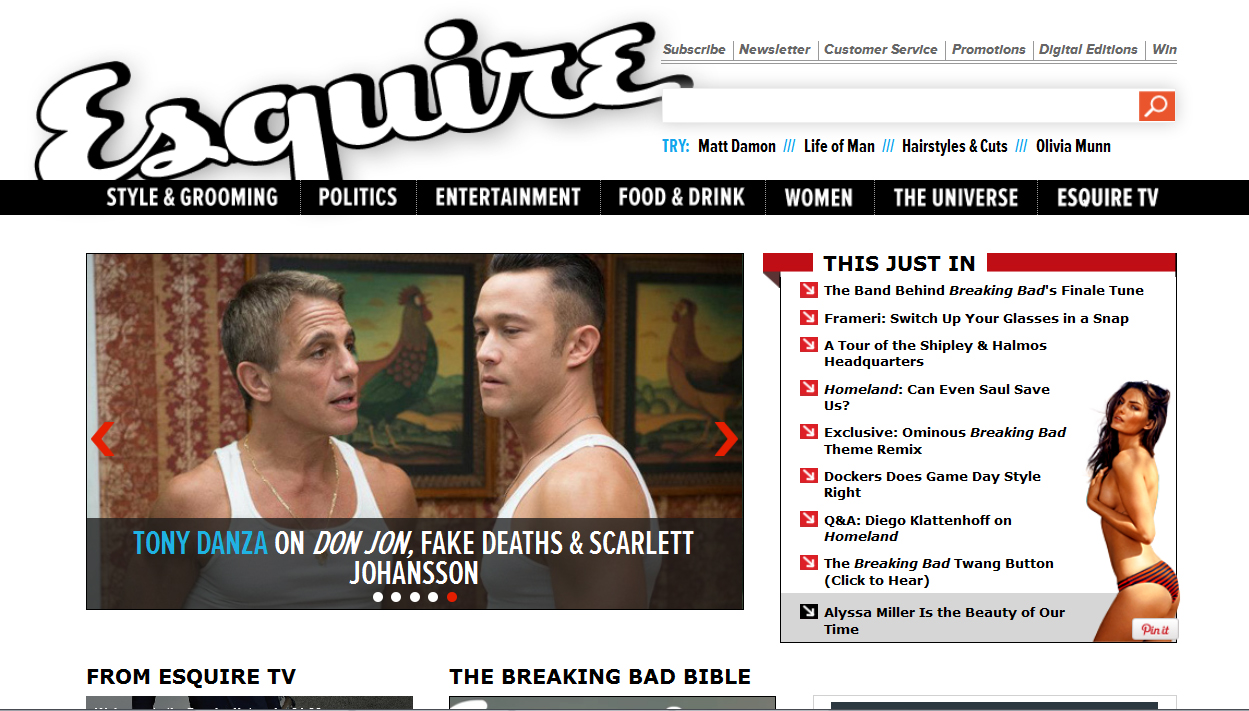 Esquire, from Hemingway articles to funny jokes from half-naked ladies
Esquire, from Hemingway articles to funny jokes from half-naked ladies
VR: How do you view the explosion in the number of style websites and blogs, which has only escalated since 2000? I feel it’s wonderful that we’ve so much to choose from, but, once again, it’s difficult to tell marketed content from that written with honesty. Do you have favourite sites that you can recommend wholeheartedly?
GBB: GBB: The bloggers I most appreciate, empathize with, and respect are many: Ivy Style and Dandyism are both authored by the same gentleman and both are very much The Real Thing. The Trad is a wonderful perspective on life that incorporates but doesn’t take clothes as its necessary focus. This is also true of Maxminimus and Tweedland. For stunning photography of well-dressed, stylish men, you can’t beat Rose Callahan, The Sartorialist, Rugged Old Salt. And for erudite discussions of clothing, my picks would be Put This On, Die Workwear, Parisian Gentleman, Permanent Style, The London Lounge, Gentlemen’s Gazette. And last, but certainly not least, Keikari.com for the extensive interviews with professional people in the clothing field which center on style and craftsmanship, as well as the historical analyses and insightful quotes. Keikari and Gentleman’s Gazette are really what I think a stylish men’s magazine should be. The thread that holds all of these together in my mind is their intelligent aesthetic. The gentlemen who produce these sites are erudite and unimpeachable purists.
VR: Have you visited any of the major online style forums, like Askandy, Styleforum and such?
GBB: I almost never post anything on these sites myself, although I have contributed to several of them on a few occasions, as well as infrequently commented on something posted. My reason is simply because I make my living from writing; it’s not an anonymous avocation for me. I feel much more comfortable commenting on sites which have nothing to do with my profession — as most blog commentors do — where I am truly an amateur in the financial sense of the word.
VR: I feel so-called classic men’s clothing are now more popular than they’ve been in decades, but I’m unsure whether this popularity is only a fleeting fashion. You must have talked to quite a few within the industry; has the tailored style come back to stay?
GBB: I believe it was Bismarck who said that he felt much more comfortable predicting the past than the future. I couldn’t agree more. Most of my time has taken up trying to understand the past, how and why we arrived at where we are now, and parenthetically what that says about us. If I could predict the future I would probably be both rich and unhappy. At the moment tailored clothing is enjoying something of a renaissance. My explanation is that it is an elective luxury status symbol in a world of the cheap and shoddy. “Custom-made” anything is the height of luxury in a world of the mass produced. And there are more choices now than ever, and because of the internet more people are aware of these choices. This is all wonderful.
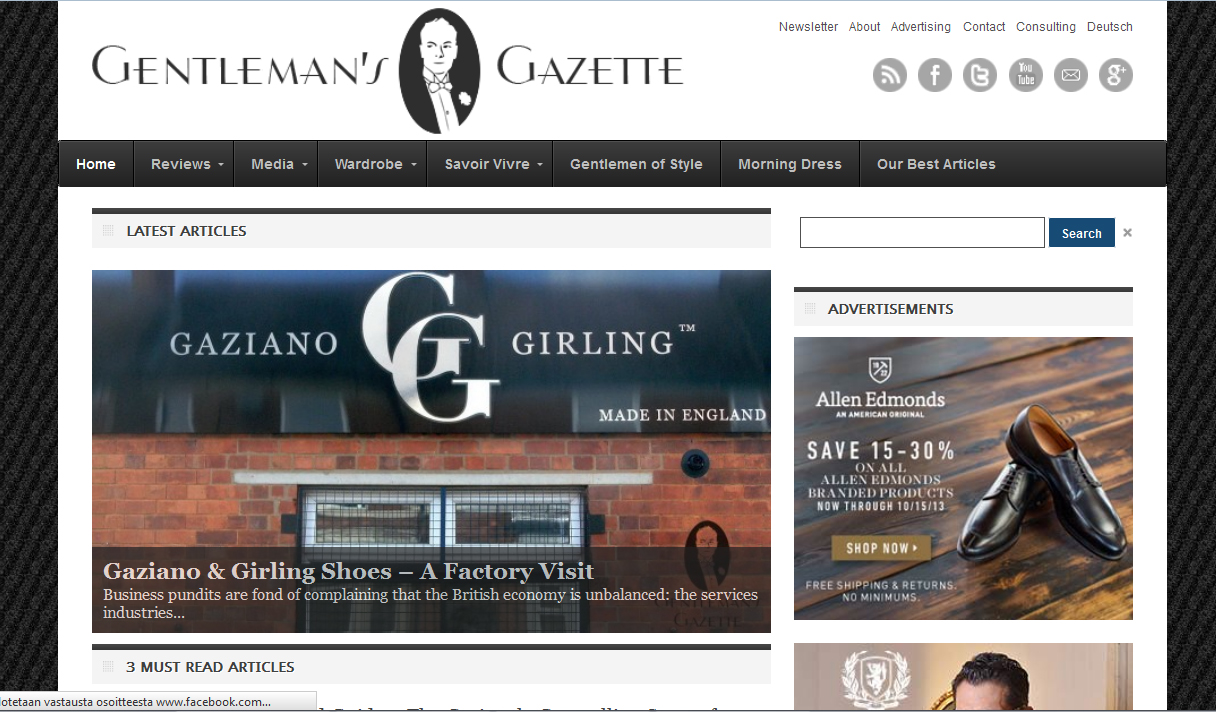 Gentleman’s Gazette, what a stylish men’s magazine should be
Gentleman’s Gazette, what a stylish men’s magazine should be
VR: How do you see the future of menswear journalism? Have you any predictions of what the future might hold?
GBB: The downside to journalism today is that false, misunderstood, and misguided information is so easily and quickly published and transported to so many. And because so much of it is anonymous, and therefore unaccountable, ethical and moral guidelines and answers once again lag behind technology. The question was very much on the Victorian mind: should we do something merely because we can? Their vexation was horrible in a multitude of ways. We can only hope that we will fare better.
Category Arbiter Elegantiae, Interviews | Tags:

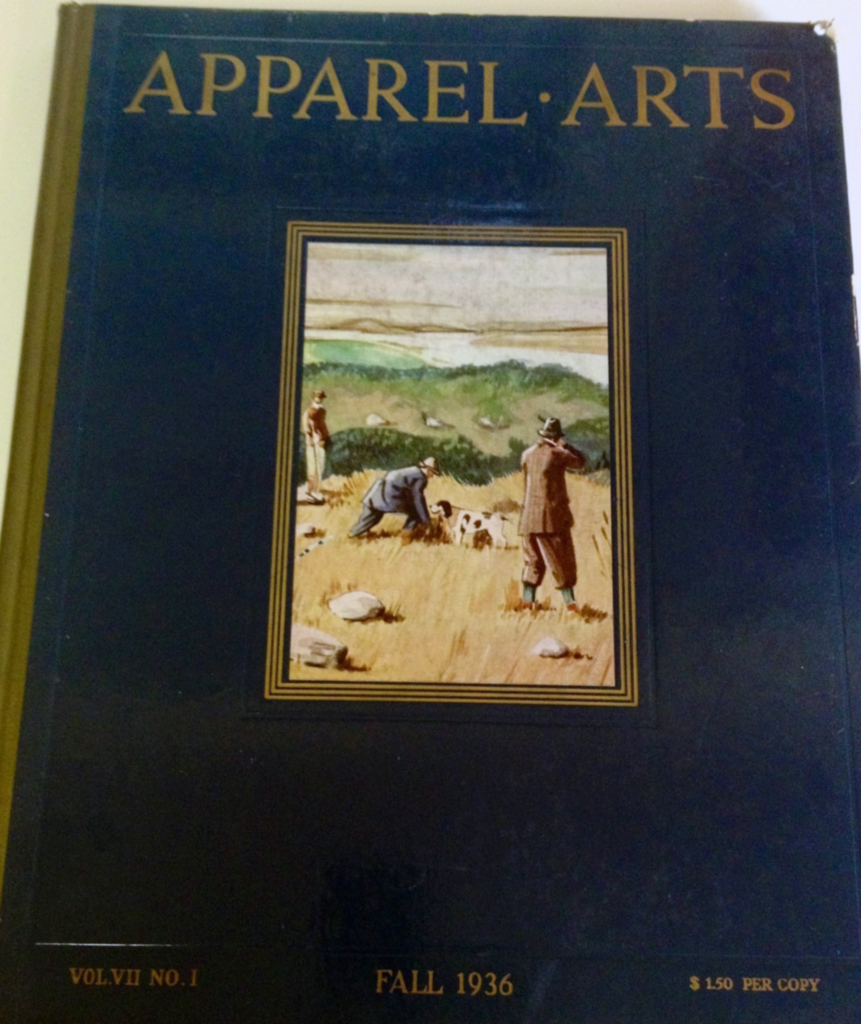
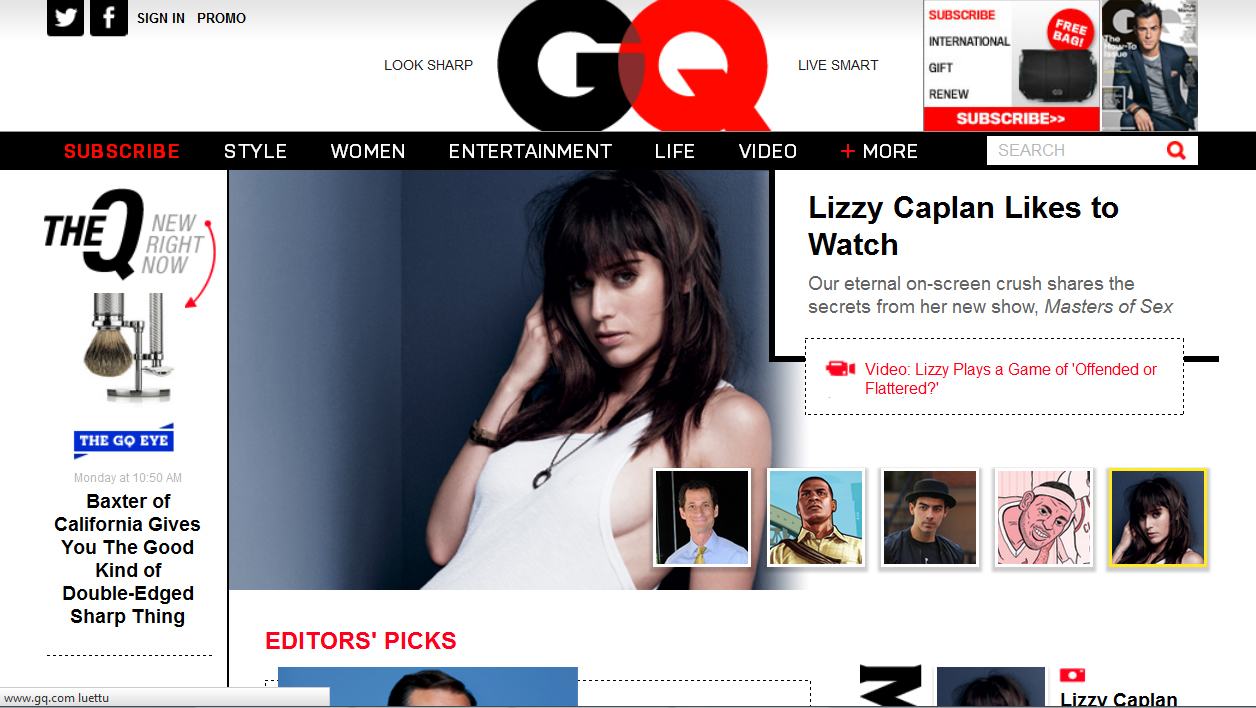
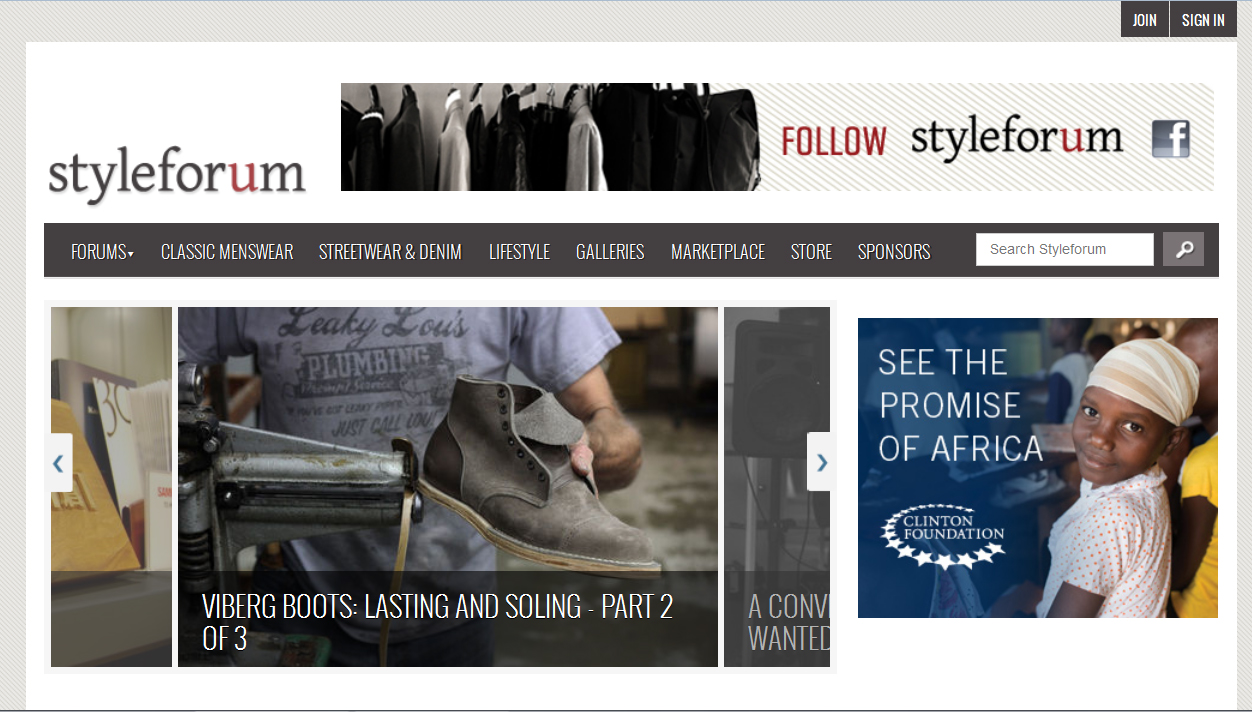
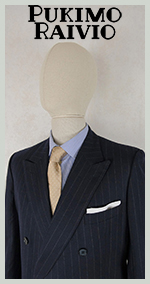

[…] G. Bruce Boyer in his second interview with […]
Greetings, Sven,
and thank you for the addition. It’s clear why Mr Boyer recommended GG as one of the finest. I will email you about the other sites later on today.
Interesting interview with a great menswear writer. As the an author myself, I think it is of utmost importance to always be faithful to your readers and yourself. That means
1. I am always absolutely honest in what I think about a product, service or style.
2. I want to provide useful information that actually helps the readers.
Our advertisers appreciate that we don’t sugar coat things, that we say what we really think and love us for it, and so do our readers. Material connections are disclosed, and before we accept an advertiser, we have tested the products to ensure they are up to our standards.
If a review doesn’t turn out to be overly positive, then a good advertiser will change the product and resubmit it. A bad one will cancel the advertisement.
Apart from that, I think many see advertising as an evil but it does not have to be like that.
In our case, it enables us to hire authors from around the globe, who can then create more unique content that is helpful to readers.
If someone runs a blog full time, they have to make money somehow to pay for rent food and to support the family.
You can either charge the reader, have advertisers or become an affiliate. In any case, if the money is reinvested in content, everybody wins.
Ville, what blogs in your opinion have suffered from advertising?
I hear you, I’m just giving you a hard time, probably unfairly. But I do think the issue is not very clear-cut, and the onus is on the reader/consumer to evaluate each writer’s honesty, integrity, and taste.
Heya,
yes, Keikari has banners. The extent that these advertisers have over the site’s content, however, is limited to these banner places and a few yearly sales notices on the site’s FB group. No hype, no twisted reviews, no flashing neon colours, no ads disguised as posts. If materials, make or service are poor, these will be called out — and I’ve lost advertisers by being frank. What I’m questioning are motives. Too many writers have replaced content with sales pitches, articles with pretty pictures, usefulness with entertainment. This interview will serve as a reminder to myself not to loose earnestness.
Nice interview. Kind of amusing to see you questioning the motives of other writers in the text right next to the ads running down the left side of the page though.